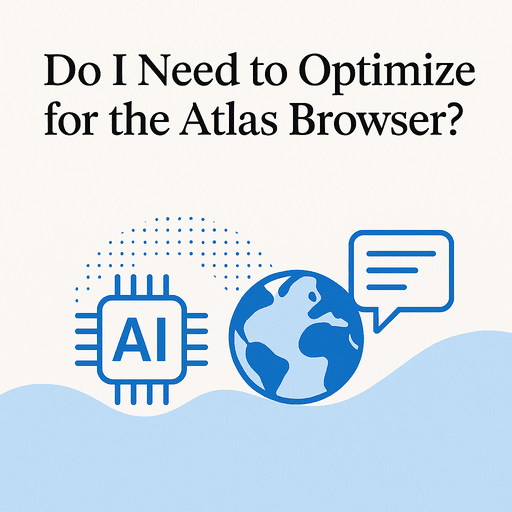Do I Need to Optimize for the Atlas Browser?

Short Answer: Atlas Browser uses AI to generate summarized answers instead of traditional search results. You don’t need a separate SEO strategy because optimizing for Atlas is essentially the same as doing Generative Engine Optimization (GEO).
The Rise of Atlas Browser
A new kind of browser is quietly reshaping how people find information online: Atlas Browser. Built by the same team behind ChatGPT, Atlas blends OpenAI’s language models with web search to deliver fast, summarized, and contextual answers, not just lists of links.
Instead of relying on traditional ranking signals, Atlas evaluates meaning, trust, and factual accuracy. It combines browsing, AI reasoning, and private search into a single experience.
For brands and creators, this raises an important question: Do I need to optimize specifically for Atlas? The answer lies in understanding that Atlas doesn’t represent a new SEO frontier. It represents the next stage of AI-driven discovery.
What Makes Atlas Browser Different
Atlas is part of a growing wave of AI-powered browsers that merge search, chat, and comprehension. Rather than pointing users to dozens of pages, Atlas delivers synthesized responses that cite multiple verified sources.
Because it’s powered by OpenAI’s technology, Atlas interprets web pages the same way ChatGPT does: by understanding natural language, entity relationships, and contextual relevance. That means success in Atlas depends less on backlinks or keyword placement and more on clarity, credibility, and content structure.
If you’ve already improved your website using trust-enhancing landing page techniques like reinforcing author identity, visual trust cues, and factual transparency, you’re already creating the type of content Atlas prefers to summarize and cite.
In fact, according to OpenAI’s official announcement about ChatGPT Atlas, website owners can now help Atlas better understand their pages by adding ARIA tags. These accessibility tags improve how the integrated ChatGPT agent interprets on-page content, links, and interactive elements. This small technical step can make your site easier for both users and AI agents to navigate, boosting its visibility inside Atlas results.
Atlas Browser Optimization = Generative Search Optimization
If you’ve been following AI search trends, you’ve likely heard of Generative Engine Optimization (GEO). GEO focuses on making content readable, factual, and easy for AI models to summarize and cite. That’s exactly how Atlas works.
Unlike traditional search crawlers, Atlas relies on semantic understanding rather than simple keyword matching. It interprets meaning and relationships between entities, not just which pages contain certain phrases.
And since Atlas answers often pull from multiple angles of a topic, it rewards content that anticipates different forms of a user’s question, an approach known as query fan-out optimization. In simple terms, the more variations of a question your content covers clearly, the better chance you have of being cited in AI-generated results.
If you’ve already optimized for AI Overviews, Perplexity, or ChatGPT Search, you’re already optimizing for Atlas.
Core GEO Practices That Help You Rank in Atlas
-
Deliver verifiable facts. Include statistics, clear data, and named sources that AI systems can check and quote confidently. See how fact-density improves AI visibility in this breakdown on AI fact coverage.
-
Use structured data. Mark up FAQs, How-Tos, and products so Atlas can interpret your page contextually.
-
Lead with clear answers. Begin sections with short, declarative statements before expanding on them.
-
Add contextual richness. Explain relationships, causes, and effects to show depth and expertise.
-
Show your trust signals. Add author bios, publication dates, and cited sources that reinforce authority.
How Atlas Uses Context and Trust
Atlas rewards content it can understand and trust. Like Google, it likely evaluates pages based on E-E-A-T (Experience, Expertise, Authoritativeness, Trustworthiness) principles. You can see Google’s own helpful content guide as a comparable reference.
When Atlas composes an answer, it doesn’t just quote text. It decides whether your source is credible enough to include. That’s why accuracy, transparency, and author identity matter more than ever for AI visibility.
Should You Optimize Specifically for Atlas?
No new checklist required. Optimizing for Atlas means continuing to practice Generative Engine Optimization by producing content that’s AI-readable, answer-dense, and semantically structured.
Atlas isn’t an isolated search engine. It’s part of the Generative Web, where AI models like ChatGPT, Claude, Perplexity, and Brave Summaries all surface factual, summarized results. Focusing on GEO ensures your content performs across all of them, not just one.
How to Future-Proof Your Content for AI Browsers
-
Use semantic headings that match natural language queries.
-
Include FAQs and TL;DRs for fast answer extraction.
-
Keep citations current and link to authoritative sources.
-
Write conversationally so AI can parse your tone and structure easily.
-
Use ARIA tags where appropriate to help AI browsers and assistive tools interpret your content more effectively.
-
Avoid fluff that might confuse summarizers or dilute relevance.
These techniques future-proof your visibility as AI browsers continue to evolve.
The GEO Mindset Is the New SEO
Atlas Browser shows where search is heading, a world where AI curates, verifies, and explains instead of simply ranking. But you don’t need to chase every new platform. By embracing the GEO mindset, you’re already optimizing for all AI-powered discovery systems.
If your content speaks clearly, cites accurately, and demonstrates expertise, it won’t just rank, it will be referenced across AI browsers like Atlas, ChatGPT, and Perplexity.
Need help creating GEO-ready content that performs across AI browsers like Atlas? Contact me to future-proof your SEO strategy for the generative web.

0 Comments Add a Comment?